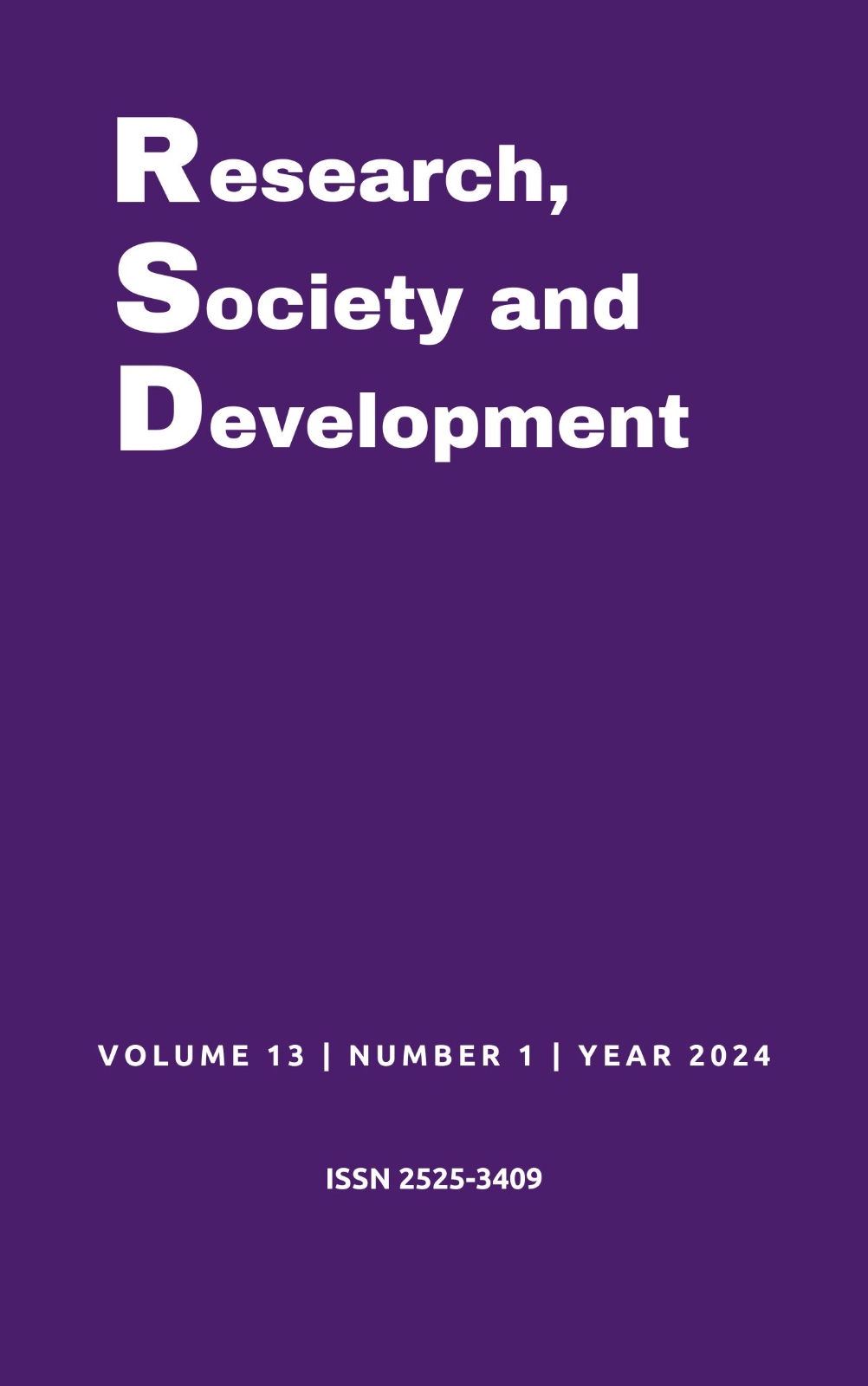An association study between nutritional status and eating habits of students from a Federal Technical School in the North of Minas Gerais, Brazil
DOI:
https://doi.org/10.33448/rsd-v13i1.44056Keywords:
Eating habits, Nutritional status, Student.Abstract
The present study aims to investigate the association between the nutritional status and eating habits of students from a federal technical school in the Northern region of Minas Gerais, Brazil. This is a cross-sectional study, with a random sample of 466 adolescents of both sexes, aged between 13 and 19 years of high school in a federal technical school in the North of Minas Gerais.Food consumption was assessed through a Habitual Intake Recall (RHAB). Weight and height were measured to assess nutritional status based on Body Mass Index (BMI) by age. The association between nutritional status and eating habits was verified by univariate analysis followed by multivariate linear regression.There was a prevalence of overweight of 15% among students. The variables that, after data analysis, remained in the multivariate logistic model, were associated with excess weight were: male gender, practice of physical activity.The prevalence of overweight among adolescents was below regional and national values, however overweight adolescents showed a significant difference in food intake regarding the intake of milk and dairy products compared to eutrophic adolescents.
References
Arroyo, Á. M. (2019). Dieta, excesso de peso e puberdade em adolescentes chilenos (Doctoral dissertation, Universidade de São Paulo).
Araki, E. L., Philippi, S. T., Martinez, M. F., Estima, C. D. C. P., Leal, G. V. S., & Alvarenga, M. D. S. (2011). Padrão de refeições realizadas por adolescentes que frequentam escolas técnicas de São Paulo. Revista Paulista de Pediatria, 29, 164-170.
Batista, M. D. S. A. (2019). Proposta de plano de ação, no âmbito do programa saúde na escola, para prevenção e controle da obesidade infantil em um município da grande São Paulo-SP. BIS. Boletim do Instituto de Saúde, 20(1), 52-58.
Barufaldi, L. A., Abreu, G. D. A., Oliveira, J. S., Santos, D. F. D., Fujimori, E., Vasconcelos, S. M. L., & Tavares, B. M. (2016). ERICA: prevalência de comportamentos alimentares saudáveis em adolescentes brasileiros. Revista de Saúde Pública, 50.
Da Silva, J. R. S., da Silva Marinho, N., Estebanez, L. F., & Sperandio, N. (2023). Alimentação escolar e estado nutricional de estudantes da rede pública de Macaé, RJ. Segurança Alimentar e Nutricional, 30, e023007-e023007.
Flores, S. H. D. (2023). Alimentação saudável: uma análise dos hábitos alimentares dos alunos do ensino médio de uma escola estadual.
Hosmer, D.W, & Lemeshow, S. (1989) Applied logitic regression. John Wiley.
Kassebaum, N., Kyu, H. H., Olsen, H. E., et al. (2017). Child and adolescent health from 1990 to 2015: findings from the global burden of diseases, injuries, and risk factors 2015 study. JAMA pediatrics, 171,6, 573–592.
Melo GA, et al. (2020) Family meal frequency and its association with food consumption and nutritional status in adolescents: A systematic review. PLoS One,15, 90, 10-15.
Mihrshahi, S., Drayton, B. A., Bauman, A. E., & Hardy, L. L. (2018). Associations between childhood overweight, obesity, abdominal obesity and obesogenic behaviors and practices in Australian homes. BMC public health, 18, 1-10.
Minayo, M.C.S. O desafio do conhecimento: pesquisa qualitativa em saúde. (14a ed.), Hucitec, p.407, 2014.
Marconi, M.A, Lakatos, E.M. Fundamentos de metodologia científica. (5a ed.), Atlas, 2003.
Oliveira, B. M. F. D., & Frutuoso, M. F. P. (2020). Sem receita: deslocamentos do olhar da Nutrição sobre o comer de crianças autistas. Interface-Comunicação, Saúde, Educação, 24, e190597.
Simões, A. M., Machado, C. O., & Höfelmann, D. A. (2021). Associação do consumo regular de café da manhã e comportamentos relacionados à saúde em adolescentes. Ciência & Saúde Coletiva, 26, 2243-2251.
Sociedade Brasileira de Pediatria (SBP). Manual de Alimentação: orientações para alimentação do lactente ao adolescente, na escola, na gestante, na prevenção de doenças e segurança alimentar. (4a ed.), (2018). https://www.sbp.com.br/fileadmin/user_upload/_21089k-ManNutro_Alimentacao_para_site.pdf.
Rabelo, R. P. C. (2018). Implantação de um Programa Interdisciplinar para o controle da obesidade infantil na Secretaria de Saúde do Distrito Federal. Comunicação em Ciências da Saúde, 29(1), 65-69.
Rodrigues, G. M., Costa, M. A., Fontes, S. C., & Ferreira, K. D. (2020). Predisposição genética como fator determinante para a ocorrência da obesidade infantil. Revista Liberum accessum, 5(1), 32-41.
Rampersaud, G. C., et al. (2005). Breakfast habits, nutritional status, body weight, and academic performance in children and adolescents. J Am Diet Assoc, 105(5):743-760.
Trancoso, S. C., Cavalli, S. B., & Proença, R. P. D. C. (2010). Café da manhã: caracterização, consumo e importância para a saúde. Revista de Nutrição, 23, 859-869.
Vale, D., Lyra, C. D. O., Santos, T. T. D., Souza, C. V. S. D., & Roncalli, A. G. (2021). Adesão à alimentação escolar por adolescentes brasileiros: determinantes individuais e do contexto escolar. Ciência & Saúde Coletiva, 26, 637-650.
World Health Organization Geneva, Switzerland: WHO Expert Committee. (1997). Health needs of adolescents. Tech. Rep. 609.
Downloads
Published
Issue
Section
License
Copyright (c) 2024 Daniela Souza Santos de Sá; Ronilson Ferreira Freitas; Roberta Barroso; Eryka Jôvania Pereira; Tahiana Ferreira Freitas; Nely Cristina Medeiros Caires; Juliana Andrade Pereira; Romero Alves Teixeira

This work is licensed under a Creative Commons Attribution 4.0 International License.
Authors who publish with this journal agree to the following terms:
1) Authors retain copyright and grant the journal right of first publication with the work simultaneously licensed under a Creative Commons Attribution License that allows others to share the work with an acknowledgement of the work's authorship and initial publication in this journal.
2) Authors are able to enter into separate, additional contractual arrangements for the non-exclusive distribution of the journal's published version of the work (e.g., post it to an institutional repository or publish it in a book), with an acknowledgement of its initial publication in this journal.
3) Authors are permitted and encouraged to post their work online (e.g., in institutional repositories or on their website) prior to and during the submission process, as it can lead to productive exchanges, as well as earlier and greater citation of published work.


